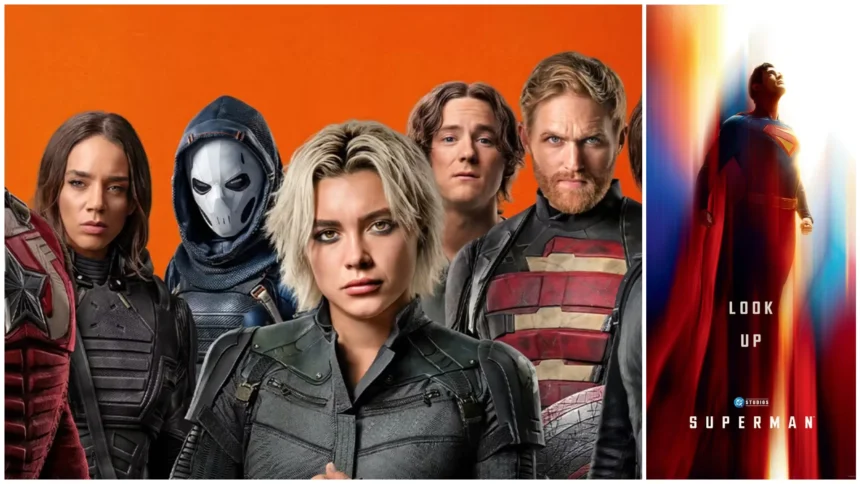There's a small, delicious scandal in this year's comic-book box office: the movie critics liked best is not the one that made the most money. Thunderbolts* — Jake Schreier's misfit-mercenary send-up with a conscience — now holds the highest Tomatometer among 2025's big superhero releases, outranking James Gunn's widely seen Superman. That inversion — praise without profit — tells us something about the state of the genre right now.
Let's be concrete before we get poetic. Thunderbolts* opened in U.S. theaters on May 2, 2025 and has an 88% critics' score on Rotten Tomatoes; its worldwide theatrical haul sits around the low-to-mid $300 millions (about $382M), a total most analysts say leaves it shy of break-even. By contrast James Gunn's Superman (released July 11, 2025) sits at an 83% Tomatometer and has cleared roughly $611M worldwide — a very respectable business result.
So why did critics crown the underdog? The short answer: tonal craft, ensemble focus, and a willingness to be small where it matters.
Why the critics loved Thunderbolts* (and why audiences didn't rush)
Read the Rotten Tomatoes consensus and you get the gist: reviewers praise Schreier's ability to turn what could have been another disposable “big IP” product into a shaggy, slightly bruised character piece — a movie that trusts its actors to do the connective tissue work between punchlines and pathos. Florence Pugh's presence and the movie's oddball chemistry were repeatedly cited as saving graces.
But critical affection doesn't automatically translate to mass turnout. Industry reporting after the release showed the math was unforgiving: with reported production and marketing costs that pushed break-even targets toward the mid-hundreds, Thunderbolts* simply didn't hit the threshold many in the business expected — and that's on the receipts, not the reviews. Variety (via subsequent coverage) and box-office analyses pegged the film's necessary break-even around ~$425M — a number the final worldwide gross failed to meet.
Kevin Feige himself — asked about the shortfall at a July press sit-down — offered a blunt, instructive diagnosis: many moviegoers “didn't know that title,” and some believed they needed to have seen related Disney+ shows to understand the film. In other words: marketing friction and franchise fatigue, not quality, seemed to suppress legs.
Aesthetics over spectacle (and critics reward that)
More than an argument about star wattage or franchises, this is a debate about film grammar. Thunderbolts* leans into character beats, odd textures, and restrained color palettes where other tentpoles strip everything to neon spectacle. That's the kind of thing critics — and a subset of cinephiles — respond to: smaller choices that compound into a distinct tonal signature. For critics, that's worth praising; for multiplex audiences habituated to spectacle and brand shorthand, that's not always enough to compel repeat viewings.
Contrast the two approaches: Gunn's Superman is engineered as a broad relaunch — clear iconography, big moral stakes, repeatable beats — and audiences rewarded it with volume even if some critics noted it's more conventional. Thunderbolts* is riskier, weirder, and — crucially — easier to adore in a single sitting than to evangelize to a casual moviegoer who's choosing between kids' animation and a $20 IMAX ticket.
The market consequence: critical wins can't subsidize structural problems
This year's rankings (Rotten Tomatoes Tomatometers: Thunderbolts* 88%, The Fantastic Four: First Steps 87%, Superman 83%, The Toxic Avenger 83%, Dog Man ~81%, Captain America: Brave New World 46%) show critics responding warmly to films that took certain tonal or narrative chances. Yet studios still answer to dollars, and the math bites.
If you read studio memos — and you read Feige's public takeaway — the immediate lesson is operational: simplify the marketing hooks, make titles less inscrutable, and decouple perceived “must-see” TV tie-ins from the theatrical product. That's not philosophy; that's survival strategy when $100M ad spends are expected to translate into global blockbuster rents.
What this means for the genre (short version)
Critics want craft and risk. Audiences — the paying ones, at scale — still prefer clarity and spectacle. The divide is not new. What's new is the speed at which the economics punish a film that pleases critics but fails to communicate itself in the marketplace.
For creators: there's a sweet spot to be found — chase the character work, but don't hide the film under a punny title or an overcomplicated release plan. For studios: honoring both the marketplace and artistry means smarter — not louder — campaigns. For viewers: if you loved Thunderbolts* you're not wrong; you just belong to a critical minority whose tastes aren't yet big enough to make the corporate bottom line sing.
What to remember about 2025's superhero landscape
Critics rewarded craft over scale. Thunderbolts* is proof that reviewers still value voice and ensemble nuance, even in IP cinema.
Box office remains brutally arithmetic. Good reviews don't erase high production/marketing overhead; the film's ~$382M worldwide gross left it short of the reported $425M break-even mark.
Marketing matters as much as the movie. Feige's public note that “nobody knew the title” was a rare candid look at how branding failures can throttle a film's reach.
Big wins still belong to clarity. Superman (Jul 11, 2025) translated scale into dollars — a reminder that a clear, emotionally legible blockbuster still plays well worldwide.
Release dates you should know. Thunderbolts* — May 2, 2025; Superman — July 11, 2025; The Fantastic Four: First Steps — July 25, 2025; Captain America: Brave New World — Feb 14, 2025; The Toxic Avenger — Aug 29, 2025; Dog Man (US) — Jan 31, 2025. These are the confirmed theatrical dates driving this year's public conversation.
Source: RT












